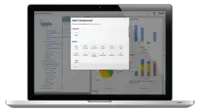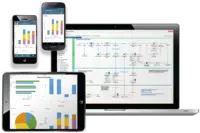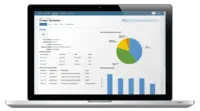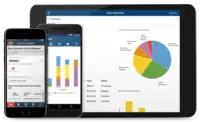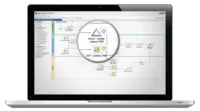Overview
What is Appian?
Appian is a low-code development and business process management platform. It features drag-and-drop design for app building, automated work processes, unified data management, and cloud-based deployment.
Great Low code - no code Workflow tool in the market!!
TrustRadius Insights
Appian Is The Best Low ode Plateform
Low-code Prog: The Best Way To Digitalize Your Life
Best in class BPM tool
Appian is one of the best Low Code platform
BEST BPM TOOL - APPIAN
Quickly deliver upon your ROI goals
Leading us into the future
Appian--reduce time and effort for employees
remote user
A+ for Appian
its helpful
very good workflow software
Awards
Products that are considered exceptional by their customers based on a variety of criteria win TrustRadius awards. Learn more about the types of TrustRadius awards to make the best purchase decision. More about TrustRadius Awards
Popular Features
- Platform Scalability (73)9.494%
- Reusability (75)9.494%
- Drag-and-drop Interfaces (72)8.989%
- Visual Modeling (73)8.888%
Reviewer Pros & Cons
Pricing
Appian Community Edition
$0
Application - Input-Only
$2
Application - Infrequent
$9
Entry-level set up fee?
- No setup fee
Offerings
- Free Trial
- Free/Freemium Version
- Premium Consulting/Integration Services
Product Demos
APPIAN DEMO RECORDING SESSION # 91-9866955524
Appian Developer Tutorial for Beginners | Appian Training
APPIAN DEMO
APPIAN DEMO | Harsha Trainings |
Features
Low-Code Development
Low-code development tools allow non developers to build simple process applications with little oversight. These tools simplify the application building process, and are frequently used for simple process applications.
- 8.8Visual Modeling(73) Ratings
Visual modeling tooling allows business users to design processes visually.
- 8.9Drag-and-drop Interfaces(72) Ratings
Drag-and-drop interface for building applications
- 9.1Platform Security(71) Ratings
Security guardrails in place to help prevent malware, data breaches etc.
- 8.8Platform User Management(72) Ratings
Tools enabling admins to control user access and on-board and off-board users
- 9.4Reusability(75) Ratings
An internal repository where assets, modules, and even entire applications can be reused
- 9.4Platform Scalability(73) Ratings
Apps developed by low-code platform must be scalable and capable of supporting large numbers of users
Product Details
- About
- Competitors
- Tech Details
- Downloadables
- FAQs
What is Appian?
Appian provides a software development platform that combines Full-Stack Automation and enterprise low-code to rapidly deliver business applications. Appian can be used to improve customer experience, achieve operational excellence, and simplify global risk and compliance.
Appian is a platform for building enterprise software applications. Appian boasts running some of the most important processes at companies like Enterprise Rent-A-Car, Aviva, Dallas/Fort Worth International Airport, and the US Department of the Treasury.
Some Appian use cases include - Intelligent Business Process Management Systems (iBPMS), Dynamic Case Management (DCM), Digital Process Automation (DPA), Robotics Process Automation (RPA), and Low-code Development.
Appian Features
Low-Code Development Features
- Supported: Visual Modeling
- Supported: Drag-and-drop Interfaces
- Supported: Platform Security
- Supported: Platform User Management
- Supported: Reusability
- Supported: Platform Scalability
Appian Screenshots
Appian Videos
Appian Competitors
- OutSystems
- Pega Platform
- Salesforce
Appian Technical Details
| Deployment Types | On-premise, Software as a Service (SaaS), Cloud, or Web-Based |
|---|---|
| Operating Systems | Windows, Linux |
| Mobile Application | Apple iOS, Android, Windows Phone, Blackberry, Mobile Web |
Appian Downloadables
- Enterprise Checklist: Pave The Path To Digital Prowess With Low-Code Platforms
- The BPM Guide: Accelerating Digital Transformation
- The Case Management Guide
- Appian Product Overview
- Appian Premier Support
- Deliver Customer Experience Excellence
- Appian for Employee Experience
- Appian Intelligent Contact Center™ Platform
- The Total Economic Impact™ Of Appian
- The 2021 Ultimate Low-Code Automation Buyer's Guide
Frequently Asked Questions
Comparisons
Compare with
Reviews and Ratings
(268)Community Insights
- Business Problems Solved
- Pros
- Cons
- Recommendations
Appian has proven to be a versatile and valuable tool for a wide range of use cases across various industries. Users and customers have reported success in automating business processes, improving productivity, and streamlining operations. Organizations have utilized Appian to replace manual paper-based systems, enabling online applications, document uploads, and simultaneous stakeholder reviews. This has greatly enhanced collaboration and cross-referencing of applications between different organizations.
In the healthcare sector, Appian has been instrumental in automating patient registration, diagnosis, and treatment workflows, eliminating paper-based processes and connecting patients with doctors and departments in a faster and more streamlined way. The platform has also been widely used for low code development and migrating older applications to the Appian code base. Additionally, Appian's capabilities in digital transformation and data analysis have allowed departments to study their own data and generate insightful reports.
Users have found Appian to be particularly beneficial for managing processes in areas such as trade reporting, client mailing process automation, onboarding new hires, workforce planning, case management, consumer marketing lists generation, CRM management, retail store remodeling, and even setting up cafes. They appreciate its ability to simplify complex tasks, automate mundane processes, and integrate with various systems. Furthermore, reviewers have commended Appian for its performance and scalability in handling large volumes of data and processes.
Overall, Appian's flexibility, customization options, user-friendly interface, collaboration features, advanced analytics capabilities, seamless integration with other systems, and overall capability for rapid development and deployment have made it a reliable choice for organizations looking to streamline operations and improve efficiency.
Intuitive User Interface: Users have consistently praised Appian for its visually uncluttered and intuitive user interface, with many stating that it allows for quick adoption by both internal and external users. The simplicity and user-friendly nature of the interface make it easy for business users with minimal training to navigate and perform tasks efficiently.
Low-Code Development Platform: Many reviewers appreciate the ease of use provided by Appian's low-code development platform. They find it beneficial that they can develop user interfaces without extensive coding knowledge, allowing for rapid application development and reduced reliance on traditional programming languages. This feature has made the development process more accessible and efficient.
Flexible Access Control: A significant number of users praise Appian for its flexibility in providing different levels of access to users based on their roles. This capability contributes to better data security and control within organizations, enhancing overall data management. Additionally, the ability to tailor processes for specific business needs and configure processes for new business users is seen as a major advantage, contributing to the software's adaptability.
Inflexible and Expensive License Model: Some users have found the license model of Appian to be inflexible and expensive, making it challenging for them to include end customer processes due to limitations in named user licenses or big bang packages.
Limited Exporting and Data Analysis Capabilities: Reviewers have mentioned limitations on exporting data to Excel, causing inconvenience for users who need to analyze large amounts of data. They have also encountered issues with the date-time stamp of exported data, leading to problems in data analysis.
Steep Learning Curve and Technical Limitations: Users have highlighted a learning curve associated with the different paradigms in Appian and experienced technical limitations when using certain browsers, particularly with date controls. Workarounds were needed to overcome these limitations.
The most common recommendations from users are:
-
Try Appian for quick application development with less resources. Users have found Appian to be a reliable platform for rapidly building applications without requiring excessive time or resources.
-
Create evaluation criteria and apply a defined score to each platform for an informed decision. Users suggest defining specific criteria to evaluate different platforms and assigning scores to objectively compare them. This approach helps in making an informed decision when selecting the most suitable platform.
-
Develop a small Proof of Concept (POC) to determine the requirements before deploying Appian. Users recommend starting with a small POC to understand the specific requirements and capabilities of Appian within the organization. This allows for a better understanding of how Appian can meet the organization's needs and ensures a successful deployment.
By following these recommendations, organizations can leverage the benefits of Appian and efficiently develop applications while making informed decisions about their technology choices.
Attribute Ratings
Reviews
(26-50 of 139)Appian: Best bet in the market for quick turnarounds!
- Migration from legacy systems
- Eliminating legacy approaches
- Automating business processes
- Customer onboarding reports
- Drag-and-drop interface for workflow development greatly speeds our apps' time to market.
- Using the advanced features of Appian, we are able to create working sites in a fraction of the time it would take to do so using traditional development.
- Quick to the market, a real emergency problem solver (e.g., COVID time related apps).
- Build once, deploy anywhere makes it easy to put an application in users' hands, regardless of form factor (desktop, mobile, etc.).
- I would like to see more flexibility in Appian's UI components.
- Appian's RPA capabilities are still growing. I would like to see more user-friendly management/creation of RPA processes.
- Debugging can be difficult, as error messages are not always detailed enough.
Pretty nice, with a slight learning curve
- Easy of use
- Friendly interface
- Instant results
- Multiple users editing the same interface
- Process models
- Initial ramp up may be tricky for some
Appian is a great tool for BPM
- Workflow management
- Technical engagement with development and business
- Flexible candidate tracking configuration for our specific workflow needs
- Provide enhanced and additional production usage details (similar to Salesforce)
- Expose enhanced and additional production and pre-production environment logs
Fantastic product always striving to become better
- Workflow automation
- Rapid time to market of applications
- Starting with version 21.1, Appian also does a great job at allowing developers to compare code changes from one version to another and highlighting differences
- Learning curve with Appian is lesser than with products like Pega
- Appian could introduce version control for certain key components like record types
- Parallel development of code with Appian is really hard when multiple developers share the same objects. This is an area where Appian could do better.
- Appian can keep getting better at robotic process automation to make it easier for 'low-code' developers without much knowledge of Java programming to implement RPA.
A developer's opinion.
- It's easy to get started with little development experience.
- Changes are immediately visible.
- The Appian Community website usually has quick responses to questions.
- Better configuration management.
- Better control over change management.
- Error messages contain more specific errors.
Best BPM Tool? It's Appian!
In our organization, we use Appian at full capacity to deliver the best for our clients. It is continuously evolving and always tries to meet the market requirements such as Artificial Intelligence, Document Processing, Robotic Process Automation, etc.
If you are stuck somewhere, it has a great community too where other professionals and even Appian employees are ready to help.
- Business process designing.
- Quick apps.
- Integration with other systems.
- No-code development.
- Cloud.
- OOB document processing.
- Complex business flow designing.
- Easy to code - SAIL editor.
- Architectural knowledgebase.
Where not to use Appian? If you are delivering a product to a normal Joe, then Appian might not be a good choice to go for. It is more into B2B.
I like it a lot for many reasons
- Ease of use.
- Ease to adapt.
- No need for IT to program.
- Timeline charts could be better.
- More data points in cross functional reporting.
- Ease of integration of systems.
Great coding but tough cost
- Customizability of Interfaces
- Flexibility of workflows
- Great training resources
- Fun to code
- Better process modeling development UI
- Better licensing options
- Better breakdown of variables in process modeling
Low Code Platform
- Appian's GUI design
- Easy to use Business Process' palettes
- Easy to navigate within Appian - Admin console, DB, Process Design
- Needs more robust functions libraries
- Third party Java libraries (API) support
- Support for user defined functions
Appian at an Enterprise Company
- Process Modeling
- User Experience
- Ease of development
- Integrations with other platforms
Great for speedy user interface implementation!
- Appian speeds up the development.
- Easier to build user interfaces.
- When application using Appian fails - Appian throws pretty detailed errors helping debugging.
- Search issues when type ahead and database search are used in the same field.
- Buttons implementation where user is require[d] to click on the button description - if clicks on the button outside that text - button will not work.
- Problems with using certain off-the-shelf performance tools like WebLoad or Neoload. That is because of different dynamic variables being used internally in Appian - which these tools are unable to correlate. We are still investigating using other tools like JMeter to overcome dynamic correlation problem for performance testing.
On the other hand, there are some limitations which require creating Java or Java script functions. At this point, we did not try to convert the larger projects currently developed in Java into Appian - this is where we foresee the Appian limitations.
Great product for centralizing workflows
- Role based access
- Visualization of data
- Connection to multiple third party flows (FTP, email, filedrop)
- Enterprise database access
- Common development language for extensions (.NET, Java)
- User license costs
Helps Speed Software Delivery
- Manages businesses workflows well. Increases delivery by [up] to 50% against traditional programming languages.
- Fast to develop onboarding related applications.
- Integrations- authentication mechanisms are still some[times] not out of the box like Snowflake, OAuth 2.0, [etc.]
- Lack of source control makes it hard to manage environments. Need something similar to GitHub for Appian
The Secure Web interface allows us to streamline the processes and allows access to all levels of users, as well as clients.
- Common interface design
- External system integration
- Incremental Security and integration to AD
- Scheduled and on-demand Execution
- Creation and execution of Test cases
- Patterns for DB Maintenance
- simple Value setting of variables outside of interfaces.
[It is well suited for] easy creation of repetitive processes for on-demand or scheduled execution.
[It includes] required or requested tasks assignment and notification to individuals.
[You can use] groups to support tasks when processing department-level requirements.
Beginner Appian Developer Review
- Task management through the work flow.
- Easily can be implemented for collaboration between different work groups.
- Easily can be integrated between upstream and down stream systems.
- For each release of Appian, it looks like regression testing is not proper. We see some broken old functionalities whenever it is upgraded. It can be improved.
- Record List Grid View can be made with little flexibility. So that in the future we can use records instead of building reports.
- In the monitoring view, better to keep 'process activity' tab as the first to load instead of the 'health dashboard.'
The solution(s) implemented in Appian are deployed worldwide across all Aon Reinsurance offices.
- Low code platform.
- High availability and scalability.
- Streamline integrations with external APIs.
- Monitoring and error logging.
- Integration with third party source control tools.
- Better CI/CD capabilities.
- Debug capabilities.
- OCR capabilities.
It is being very helpful in developing various banking applications like loan processing and claim settlement to name a few in easy to use manner.
- Easy to Scale Process Management
- Ready Out of the Box Functionalities solve regular problems
- Innovating by Introducing New Features like AI
- Sometimes finding OOTB functionalities is difficult specially for first time uses
- In-Line help could be improved further to help new learners
- The new Appian Certification levels are a bit confusing
Just my thought Appian might not be very well suited for small organizations considering its licensing costs.
Appian a great product in the right place!
- Allows at a glance workflow documentation which assists in the need we have for information readiation.
- Drag and drop interface for workflow development greatly speeds our apps time to market.
- Using the advanced features of Appian, we are able to create working sites in a fraction of the time it would take to do so using "traditional" development.
- There is a definite learning curve associated with Appian and functional information may be difficult to find.
- Better in line help would be a welcome addition.
- The pace of change means that, just about the time we are mastering this version, the NEXT version is coming out.
A Good Automation Tool
- Ease of implementation.
- Integration and flexibility work with multiple platforms.
- Well defined roadmap on upgrades and bringing in new features.
- Database, Appian uses MySQL and recently moved to MariaDB, which does not have good support. Appian should offer connectivity to multiple database platforms.
- Backward compatibility, Since Appian releases multiple patches, it will be good to have tools to migrate deprecated services to the supportable services.
Appian is great choice and a difference maker
- Easily integrate data over silos
- Brings together business and IT people alongside a clearcut model and languange
- Quick to the market, a real emergency problem solver
- Strong stability combined with excellent architecture
- Provides excellent customer services and insight
- License model is rigid and expensive
- Hard to include end customer processes due to named user licenses or big bang packages
Needs and pushes an agile approach. Needs internal people development in order to own the technology challenges.
- Making process models the core of the solutions you build, with AI, Bot and human interactions through low-code UX.
- Highly skilled professional services team.
- Low code data integration that provides a platform for unifying data across back-end systems.
- Ideal for building tailored case management solutions.
- No built-in support for integrating with messaging or event streaming systems.
- Limited ability to customize UX beyond the out of the box components.
- No true cloud auto-scaling (yet); relies on reserved VM instances.
- Great for internal applications where complete control of the UX is not needed and the rapid development cycle of low-code can really shine.
- Great for building tailored case management solutions where the underlying escalation process can be customized via the BPM editor.
- Not appropriate for external/customer facing web portals that are public and/or where per-user licensing is a concern.
My experience with the low-code platform
- Maintaining historical records.
- Powerful reporting options.
- Enhanced security handling.
- Ease of maintenance & reusability of business workflows.
- Better support with respect to product issues.
- Capability to connect with multiple systems.
- Capability to combine with RPA/ML/AI.
- More site branding options.
It is not suitable where we have to process millions of data more quickly (It is capable, but may take more time).
Appian 2021 Review
- Aggregating data in one location
- Speedy development
- Friendly to use interfaces without Javascript
- Record functionality has limitations with user filters default of one selection
- Unable to remember which tab the user last navigated from since there is one URL for all tabs on one page
- Unable to preview uploaded document unless it has been saved to knowledge center
Appian is a powerful rapid application development platform that integrates with almost everything
- Rabid application and interface development
- Integrating with other systems and data sources
- Appian needs an option to run processes as a service account
- Appian needs to add gcc high to its SharePoint integration
Appian is less appropriate for developing AR/VR and multimedia experiences.
- Avoid human errors
- Centralize information
- [Accessible] everywhere, via pc or mobile device.
- Need individual [Appian] license


